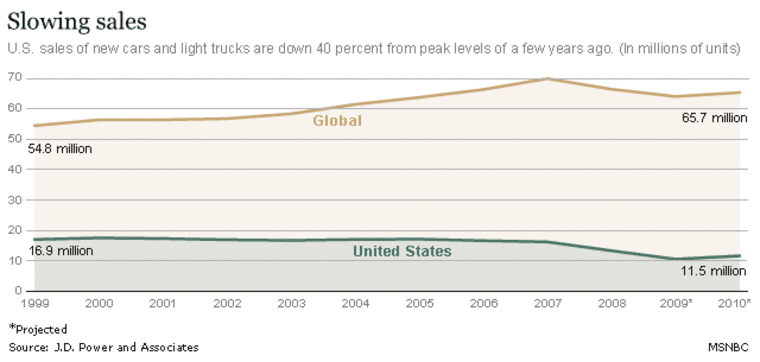Automakers in the U.S. ended their worst year in almost three decades with hints of a recovery in December.
Many, especially those selling small or inexpensive vehicles, reported improvements last month and expressed hope for a mildly better 2010.
It was a positive finish to one of the toughest years on record for the industry, with U.S. sales of cars and light trucks down 21 percent to 10.4 million as drivers blew past showrooms due to a shaky economy.
For the year, General Motors Co. and Chrysler Group LLC were the big losers. Both took government aid and spent time in bankruptcy court early in the year when sales fell to near-record lows as credit froze, unemployment rose and consumer confidence plunged.
Big winners were Hyundai Motor Co. and its low-cost Kia brand, as well as Subaru, which specializes in all-wheel-drive small cars and sport utility vehicles. Ford Motor Co., Honda, Toyota and Nissan all reported drops for the year but big gains last month.
"It's not a disaster anymore," said Aaron Bragman, an industry analyst for the consulting firm IHS Global Insight in Michigan.
Ford, the only U.S.-based automaker to avoid bankruptcy protection, fared better than its two Detroit rivals, with overall sales down 15 percent last year compared with 36 percent fewer for Chrysler and 30 percent for GM.
In fact, Chrysler sold just 931,000 cars and trucks in 2009, its worst performance since 1962 as it struggled with a lack of new products and a reputation for poor quality. It had a better December, however, down only 4 percent from the same month last year. GM sales fell 5.7 percent last month as it tried to find traction with fewer brands after shedding Saturn, Saab and Pontiac and Hummer.
Ford's final month of the year was strong, with a 33-percent increase in sales thanks to strong demand for midsize cars. Last year, it gained U.S. market share for the first time since 1995, helped by critical raves for its fuel-efficient cars, like the midsize Fusion. It's compact Focus and popular Escape crossover also boosted sales.
The automaker's restructuring plan and new products helped its performance, despite a difficult business environment, said Ken Czubay, vice president of U.S. sales.
Overall, 2009 U.S. sales dropped to a level not seen since recession-wracked 1982, when just over 10.3 million cars and trucks were sold, according to Ward's AutoInfoBank.
Yet even though U.S. sales fell for the year, Hyundai continued its surge with an 8-percent yearly gain, while Kia reported an annual gain of nearly 10 percent and a 44-percent gain in December. Both automakers specialize in smaller, lower-priced cars that were popular during a tough economic year when job security and gas prices worried drivers.
Automakers said dealerships saw the usual post-Christmas rush as buyers sought year-end bargains. Czubay said local dealer advertising was strong, but automakers held the line on incentive spending. Companies spent an average of $2,542 per vehicle on incentives in December, down 11 percent from the same month a year ago.
Czubay said it's difficult to predict whether the momentum will continue in January, but he's optimistic.
"There's actually a tremendous amount of pent-up demand out there," he said. "We believe that people are just saying, 'I can go out and be a little bit more aggressive.'"
Toyota, which saw sales dive 20 percent for the year but rise 32 percent in December, expects that overall U.S. auto sales will slowly improve this year. Its strong December was fueled by huge sales increases for its Camry midsize sedan, Corolla small car and Prius gas-electric hybrid. The company was encouraged by last month's results and improved consumer confidence.
"We feel great momentum heading into 2010," said Don Esmond, senior vice president of automotive operations at Toyota's U.S. division.
GM said its sales were down for the month partly because it reduced sales to rental car companies and other fleet buyers. Susan Docherty, vice president of sales, said 23 percent of GM's December sales went to fleets, compared to 20 percent at Toyota, 35 percent at Ford and 50 percent at Chrysler.
Docherty said GM is continuing to pull away from fleet sales, which are less profitable and can hurt brands' resale values.
Despite a whiff of hope in December, automakers and analysts said it's too early to predict just how this year will go, mainly because of uncertainty over employment.
"It's still a low market, still a depressed market and it's too early to declare there's a trend upward," said Bragman. "It's not going to be a gangbuster year. It's going to be very much a healing year."
